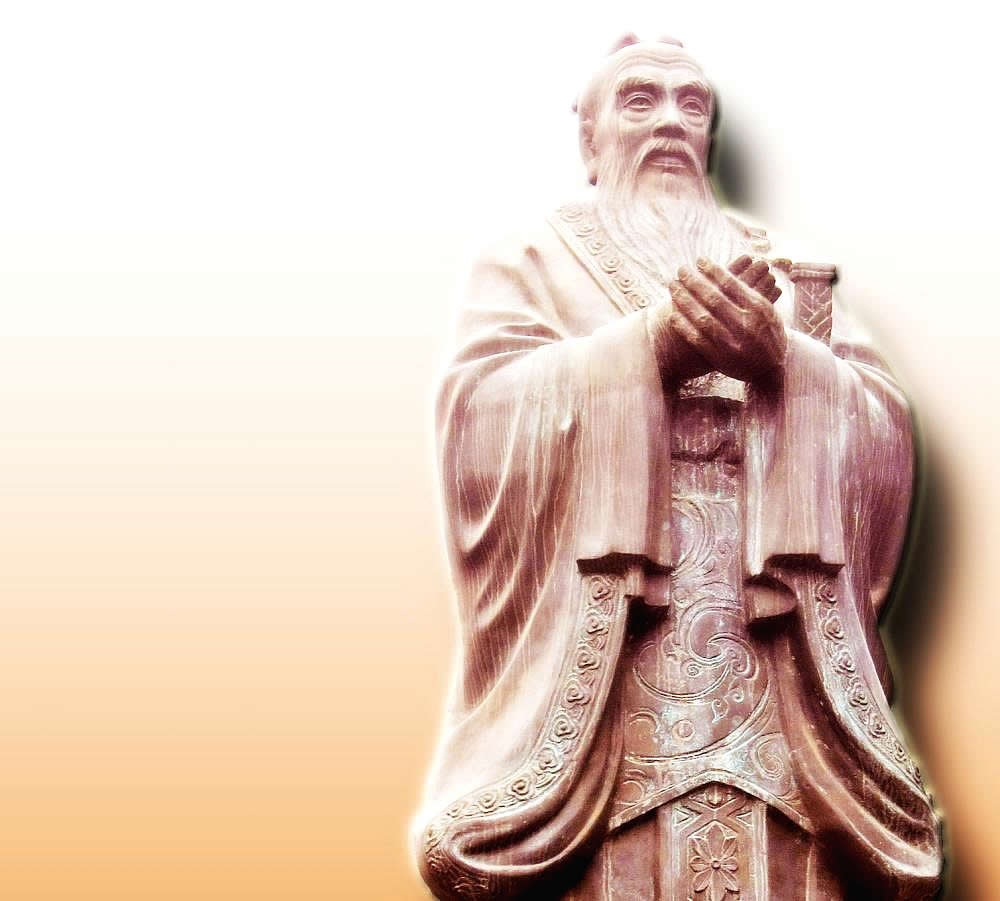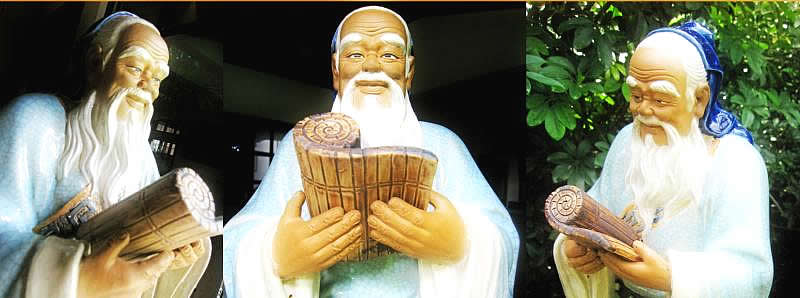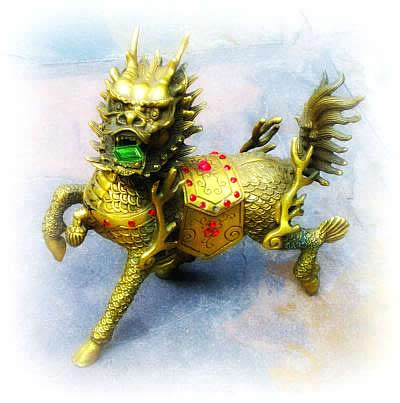 |
|

|
Essay:
Confucius was named Qiu and also known as Zhong Ni. He was a native of Qufu in the state of Lu during the Spring and Autumn Period. He was born with the virtues of a sage and learned from different teachers. He was an educator who never wearied of learning and teaching. He established universal education and advocated the integration of scholastic and martial arts.Therefore, his teaching material was based on the Six Arts—ritual, music, archery, charioteering, calligraphy, and mathematics. Later generations called him “a model teacher for all generations.” As the head of the judiciary of the state of Lu, he performed the work of a Minister. After three months under his rule, the nation was so well governed that lost articles remained untouched on the road and doors could be left unlocked at night.
Out of jealousy, the state of Qi offered female musicians to the Duke of Lu. Consequently, the Duke of Lu didn’t hold court for three days. Confucius resigned his post and traveled through the different states. He never managed to realize his political ambitions. At the age of 68, he returned to Lu, where he compiled the Book of Odes and the Book of History, organized the Book of Propriety and the Book of Songs, praised the Book of Changes and wrote the Spring and Autumn Annals. Since the Spring and Autumn Annals served to praise and critique, and to distinguish between good and evil, it was feared by traitors and usurpers.
In politics he favored loyalty and patriotism; with regard to education he advocated education for those of all walks of life; in religion he respected spirits and gods but kept his distance; with regard to learning, he believed in being humane to people and creatures. He quit writing when a unicorn (qilin) was sighted, and passed away at 73.
Commentary:
This was an outstanding sage of China and in the world. He was born on a sacred hill (qiu) called Ni. Confucius’ surname was Kong, his first name was Qiu, and he was also known as Zhong Ni. Usually people call him Elder Teacher Kong. His father’s name was Shu Liang He. Confucius had an older brother who was disabled. People called Confucius “Kong Lao Er” (the second born of the Kung’s). He was a native of Qufu in Shandong Province in the State of Lu during the Spring and Autumn Period. His birth was marked by auspicious signs. A unicorn appeared, carrying in its mouth a jade tablet inscribed with a prophecy. Nine dragons used sweet dew to bathe him. He was different from others. He traveled throughout his life in order to save the world from deterioration and to bring it peace.Confucius was born with sage-like virtues and did not study with a fixed teacher. His attitude was, “Everyone is my teacher and I’m everyone’s teacher. I always teach myself and I am constantly a teacher.” He was an educator who never tired of learning or teaching. Whenever he studied or listened to principles, he was never tired or unwilling to listen. We, on the other hand, don’t like to listen to someone unless he or she is eloquent or speaks powerfully. When he taught students, intelligent or otherwise, he never grew tired or weary. He taught them impartially and guided them gently. Adopting the Six Arts—ritual, music, archery, charioteering, calligraphy, and mathematics—as teaching material, he established education for the common people and promoted a combination of scholastic and martial arts. He was honored with a posthumous name of “a model teacher for all generations.”
Confucius was the Head of the Judiciary in the State of Lu and did the work of a prime minister. Under his rule, within three months the state was well governed. People wouldn’t take things left on the road and nobody needed to lock their doors at night. If someone lost something on the roadside, no one would pick it up. Why was this? Because no one was greedy. It was safe to leave doors unlocked at night. All the weapons were stored in the stockroom; horses were left free to roam the mountains to forage. Signs of peace were everywhere. At that time the State of Qi feared that if the State of Lu became too powerful, it would occupy Qi, so they thought of a way to destroy Lu’s government by training a group of charming women skilled in dancing and singing to delude the Duke of Lu.
At that time there was an official, Ji Huan Zi, in the State of Lu, who accepted a female music troupe from the State of Qi and offered them to the Duke of Lu. Seeing them, the Duke of Lu abandoned everything and indulged in sensual pleasures. For three days he ignored the governance of the state. Seeing this, Confucius resigned from his post and went traveling throughout various states hoping to further his ideas on saving the world. Unfortunately, the rulers of these states had no ambition and no ability to recognize talent, so no one employed him. Since ancient times, most people have been selfish; all these leaders were afraid that if he were in office, they could not recklessly enjoy their pleasures.
Confucius returned to the State of Lu and set up a school to teach students, because he couldn’t carry out his great ambition. The Apricot Grove was where Confucius taught. He taught people, poor or rich, offering education to all. He had over three thousand students, seventy-two of which were skilled in the Six Arts. The most intelligent was Yan Hui, for he understood whatever Confucius taught. Thus Confucius praised him, “I talked to Hui all day and he made no objections to anything I said—as if he were stupid. When I observe his conduct while he is away from me, I find that he is able to apply my teachings. Hui is no fool.” When Confucius talked to Yan Hui, he was silent all day long. Confucius was not sure if this disciple grasped the principles because he looked dumb. After Yan Hui left and Confucius examined his lifestyle, he found it tallied with his teachings. In many aspects Hui practiced the teachings; Hui was really not deluded.
After Confucius returned to Lu, he compiled the Book of Odes and the Book of History, organized the Book of Rites and the Book of Songs, praised the Book of Changes, and wrote the Spring and Autumn Annals. Originally, there were more pieces in the Book of Odes. Confucius selected the 300 most educational ones and deleted incorrect parts in the Book of History. He put in order the Book of Rites, the Book of Songs, and he praised the Book of Changes of the Zhou Dynasty. The Book of Changes has a praise composed by Confucius. He wrote the Spring and Autumn Annals which contains praises and critiques to discern good and evil; it made traitors and usurpers afraid so that they dared not misbehave themselves.
His political philosophy was that people should be loyal to their ruler and their country. His view on education was that people should not be discriminated because of their social standing, and he taught everyone equally. On religion, he instructed us to respect ghosts and spirits but keep a good distance from them. On study, he taught us to be humane and benevolent toward people and things. Upon the manifestation of a unicorn, he stopped writing. When Confucius saw the unicorn captured by a hunter, he noticed it had on its neck a thread tied by his mother when he was born. Confucius said, “In the time of King Yu of Tang, the unicorn (qilin) and phoenix roamed freely. It is no longer that time. Why has a unicorn shown up? Its appearance worries me.” After he said that, he stopped writing. He passed away at the age of 73.
A verse in praise says:
When I gaze at him, he appears to grow taller.
When I try to penetrate him, he seems even more solid.
I see him before me, but suddenly he’s behind me.
His spirit cannot be fathomed.
His greatness is beyond compare.
He is foremost among the sages, with none other like him.Commentary:
When I gaze at him, there is no way to see the top of him, and he appears to grow taller. / When I try to penetrate him, the more I try, he seems even more solid. Confucius was truly knowledgeable. I see him before me. Originally he was before me, but suddenly he’s behind me. His transformations are limitless and inconceivably wonderful.His spirit cannot be fathomed. Since he is inconceivable, even spirits cannot figure it out. His greatness is beyond compare. No one is greater than him. He is foremost among the sages, with none other like him. No one can compare with him.
Another verse says:
The unicorn carried a jade tablet—an auspicious sign.
Dragons bathed this remarkable man with sweet water.
During his three months in office, Lu was governed well.
When the duke was absent from court several days, Confucius left.
Traveling throughout the states, he advocated education.
He established a school in Apricot Grove to teach the masses.
The Pure Youth, Water Moon, was born in China,
Establishing a solid foundation for Buddhism.Commentary:
A unicorn carried a jade tablet—an auspicious sign. A unicorn (qilin) carrying a jade tablet in its mouth was a very auspicious prophecy.
Dragons bathed this remarkable man with sweet water. Nine dragons used water to bathe him, which was also very unusual.
During his three months in office, Lu was well governed. Confucius acted as the Head of the Judiciary for three months and the State of Lu became well ordered.
When the duke was absent from court several days, Confucius left. The Duke of Lu had not gone to court to perform his duties for three days. Seeing that he was deluded by beautiful women, Confucius lost interest, resigned his post, and set out to travel. Confucius knew when to advance and when to retreat. Traveling throughout the states, he advocated education. He traveled among several states and propagated education everywhere.
He established a school in Apricot Grove to teach the masses. When he returned to the State of Lu, he set up a school to teach many young disciples.
The Pure Youth, Water Moon, was born in China. What was his background? Confucius was the transformation of the Pure Youth, Water Moon, in Buddhism and was born in China.
Establishing a solid foundation for Buddhism. The Pure Youth Water Moon and Shakyamuni Buddha had an agreement: If Buddhism were passed all of a sudden from India to China, the Chinese might not easily accept it. Therefore the Pure Youth Water Moon served as a pioneer for Buddhism. He advocated the Six Arts—ritual, music, archery, charioteering, calligraphy, and mathematics, and taught the citizens what it meant to be human by advocating Confucianism. Lao Zi was also actually a Buddhist personage; he was a transformation of Patriarch Kashyapa. He advocated Taoism which helped the transmission of Buddhism into China so that it would be easily accepted by the Chinese.
Copyright © Buddhist Text Translation Society
Proper Use, Terms, & Conditions

